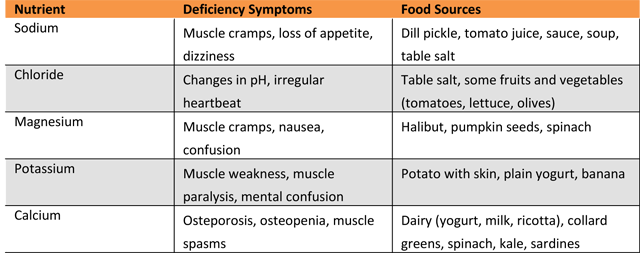Electrolytes help the body to transfer nutrients into the cells and filter the wastes out of them. Electrolytes are basically minerals in the form of salts dissolved in blood and body tissues. An electrolyte test helps to figure out the problems with human body’s electrolyte balance. Electrolytes are salts and they also help in maintaining the acid base ratio in human body.
The important electrolytes in human body are sodium and potassium. The secondary electrolytes are bicarbonates and chlorides.
Sodium operates outsides the cells and regulates the water quantities in the body.
Potassium operates inside the cells. Potassium can also be found in blood plasma. Potassium helps to regulate the rhythm of the heat during contractions.

Bicarbonate regulates the acid levels in the body. Bicarbonates will be controlled by kidneys and lungs. Disproportionate bicarbonate levels mean that either lungs or kidneys are not functioning properly.
Chloride balances the fluids in human body. If chloride quantities are exhausted, the blood becomes more acidic and disturbs the chemical reactions in the body.
All these electrolyte levels are majorly controlled by our kidneys.
When do you need an electrolyte test?
Electrolyte test can be carried out with the bunch of other blood tests. Electrolyte tests are usually ordered by your doctor if he suspects acid – base imbalance in your body.
Electrolyte tests are also recommended based on the medications the patient is using. Doctors recommend electrolyte test if the patient is undergoing the treatment for heart diseases or high blood pressure.
In general cases, electrolyte tests are useful in the assessment of heart failure, kidney diseases and hypertension.
Here are some of the symptoms of electrolyte imbalance.
- Weakness
- Muscle spasm
- Bone disorders
- Seizures
- Irregular heartbeat
- Convulsions
- Nervous system malfunctions
- Fatigue
- Numbness
- Confusion
- Twitching
- Lethargy
- Blood pressure alteration
What are the causes of electrolyte imbalance?
There are many causes of electrolyte imbalance.
- Kidney diseases
- Dehydration
- Continuous vomiting
- Heart failure
- Cancer or cancer treatment
- Bulimia
- Medications for heart diseases and high blood pressure
- Prolonged vomiting during pregnancy
- Heartwaves
- Acid base imbalance
How to analyze the test results?
Electrolyte levels in human body depend on three main things. They are the quantity of water in body, the diet intake and the electrolytes excreted by kidneys. Also, few hormones like aldosterone consume the sodium and potassium in our body which may result in electrolyte imbalance.
In case of some disorders, electrolytes are present in abnormal quantities. Doctor observes the complete balance of all electrolytes and in general cases he is more concerned about the quantities of sodium and potassium. Patients with kidney problems may retain undesired fluids in the human body. These fluids dilute the chloride and sodium levels. In the same way, those who are affected with severe loss of fluids may report the concentrated amounts of sodium, potassium and chloride in their body. Diabetes, nerve problems, heart diseases, muscle problems can also lead to electrolyte imbalance.
So doctors identify the salts which are abnormal to figure out the causes. If the electrolyte imbalances are untreated, it may lead to more complex situations like cramps, irregular heartbeat, dizziness and also death.
What are the other details about the electrolyte test?
The patient needs to control his diet according to his electrolyte test. Your diet helps a lot in refilling/controlling the electrolytes. Intake of lots and fluids, diuretics also helps in controlling the imbalance. Your doctor may ask you to take the electrolyte test couple of times during the treatment, just to make sure that it is headed in the right way.
Drugs like corticosteroids, cough medicines, oral contraceptives, laxatives and anabolic steroids increases the sodium levels in human body. Drugs like carbamazepine, diuretics and tricyclic antidepressants decreases the sodium levels.
Drugs like barbiturates, bicarbonates, hudrocortisone, steroids, fludrocortisone, loop diuretics etc helps in increasing bicarbonate levels. Triamterene, tetracycline, thiazide diuretics, nitrofurantoin, methicillin are the drugs which helps in decreasing the bicarbonate levels.
Electrolyte sample must be handled very carefully. The problem is with Potassium. Potassium leaks from the blood cells in case of wrong handling the sample. Electrolyte tests must be done then and there to avoid the errors. If the patient reports the imbalance with potassium, doctors usually order for a new test to re check.
